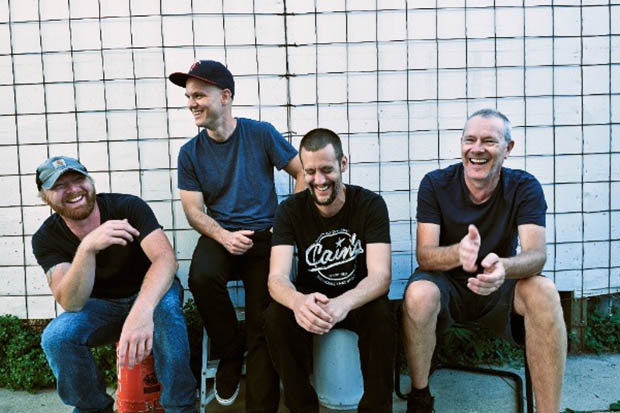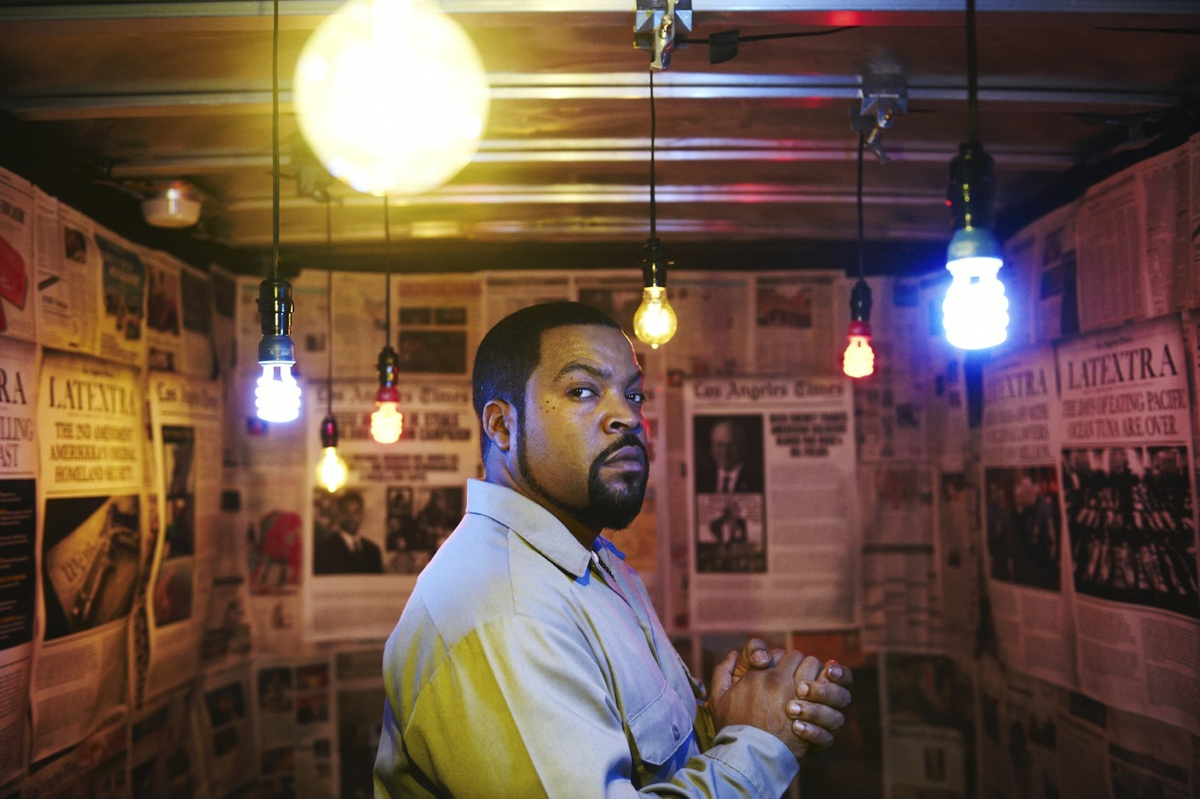Interviews
Interview with Helmet guitarist Page Hamilton
Undoubtedly, one of the most well respected rock musicians of the last fifteen years is the great Page Hamilton best known for his revolutionary work with the band Helmet. Since forming in 1989, Hamilton and Helmet in general have become very influential within their genre of music, consistently pumping out solid material. From his work with Helmet, Hamilton has become an elder statesman of sorts to many bands and musicians…

Undoubtedly, one of the most well respected rock musicians of the last fifteen years is the great Page Hamilton best known for his revolutionary work with the band Helmet. Since forming in 1989, Hamilton and Helmet in general have become very influential within their genre of music, consistently pumping out solid material. From his work with Helmet, Hamilton has become an elder statesman of sorts to many bands and musicians to come after him, including Gavin Rossdale formerly of Bush and now of the band Institute. In a lengthy and candid interview done with Hamilton a couple of months ago, we talked about among other things, working with Rossdale on his new project, Helmet’s brand new record Monochrome and Hamilton also offered the inside scoop on why the rest of his bandmates in Helmet had to recently leave the band.
Your new record Monochrome has been out about three months now. Now that it’s out, how do you personally feel about the record and how does it compare to past Helmet albums?
Page: I love the record, I’ve never been happier with an album, the last two records are my favorite records, they’re the deepest musically. That said, the earlier records had a certain, um, chalk to them, you know? I mean they were musical, but there was that kind of aggressiveness or naïve thing that’s kind of cool about them, like painting with single brushstrokes. The last two albums are kind of a development of what kind of started back in ’89 with Born Annoying and Strap It On and those albums. The new songs on the last two albums are much more challenging to play live, just musically and vocally, they’re pretty difficult, but well probably not for super virtuoso metal dudes but for me. [laughs] You know obviously this is not about sort of… Helmet has never been about technique and showing off, I think it’s more about the feel of the music which is one of those things that is harder to explain or describe….
What was the writing and recording process like for Monochrome? Did it differ at all from how you’ve done your albums in the past?
Page: Yeah this was really different than in the past, I mean I remember when I was writing “Meantime” being in a basement writing the song in New York City, there was this kind of whole different writing process, I didn’t have sort of the benefit of a kind of clarity of mind, there were a lot of distractions that were forcing me to kind of zero in at the time…. And I’ve been so dedicated to music the last couple of years, you know spending the majority of my time in Los Angeles when I’m working on producing or whatever. And I’m much more… I know what I’m doing, I’m kind of more confident and that’s why Monochrome came out so soon after Size Matters. I mean eighteen months later, and flushing out a new record deal with a new company, obviously that’s another thing, there was more money to make, this album was sort of somewhere in between Amphetamine Reptile and Interscope Records, actually closer to Amphetamine Reptile than Interscope as far as the funds go. So I couldn’t get too many people involved like there were on Size Matters with Jaybound Gardiner, Charlie Clouser and Mark Rink and the army of engineers and guys that were involved in that album which was kind of a longer process. I learned a lot writing Size Matters, because it was over seven years that I had to write songs and re-think things that I needed at the time, I needed all that time away from it to sort of zero in. That’s why the songs are as concise as they are on that album because some of those songs were in shitty shape before I went in to record them. But this album I was just really confident, I don’t know if there’s any psychological effect, but it sort of dawned on me that it doesn’t matter what you do at a certain point because some people are going to love it, some people are going to hate it no matter how great or crappy it is. And people are always going to have favorite albums or songs and you know that’s more the listener’s personal bias than basing it on anything musical or actual. I’m the same way as a listener.
The title of the record Monochrome is a word with many different possible meanings and usages. How did you come up with this title for the record and could you shed some light on the meaning behind it?
Page: I was, whenever I work on the computer, I have folders and you know how you always give everything working titles, if you have a riff or a motif or a chord progression or a lyric written on a page, it’s just a line or a word or something so I always give everything a working title when I’m making a folder. I have this chromatic kind of line in my head, chromatic being you know, consecutive, half-steps, and so it was called chromatic or something so I started thinking of mono-chromatic, cotochrome the Paul Simon song from There Goes Rhyming Simon which you know, is just a great song and I just started thinking about monochrome and single tone and what that implies in the art world. I started thinking more about what that is in the art and photography world and also how that, you know you can look at one’s life as monochromatic and sort of human existence. And just sort of thinking along those lines and also there’s to me, you know the world that I live in which is the world of the music business, I live the life of a musician, there’s a certain kind of I don’t know, to me music is becoming kind of homogenized. People’s identities are less evident and people’s influences are more evident and so when you do that you kind of smear music you know what I mean? The title works on a lot of levels and I always like titles that are interesting in that way, sometimes I’ll think of that ahead of time. I mean I had to have a conversation with my manager about Size Matters because he’s like it’s so juvenile and I’m like, well think about it though, think about the phrase “size matters”, think about our culture, think about America, think about what it implies outside just thinking about a big penis or magnum condoms or whatever. And he’s like ok, well as long as you’ve thought it out. Yes I am juvenile but at the same time, I’m a relatively thoughtful person.
To produce the record, you chose to enlist the help of an old friend Wharton Tiers who helped record Helmet’s first two records in the early 1990s. Why did you decide to go with Wharton again on the new record?
Page: I would never have left Wharton if I wasn’t sort of persuaded by people that were guiding me at the time and I was very naïve and trusting at the time. I didn’t see a reason to work with anyone besides Wharton, but you know people kind of talk you into things and in retrospect it was probably good to get away from that comfortable environment and work with other people but I just had such a comfortable work flow with him and I trust him, he’s responsible for really kind of helping me shape what Helmet was, especially when it comes to my guitar style because I had this kind of technical training you know, jazz and classical guitar and I grew up on Led Zeppelin and Aerosmith and then got turned on to Killing Joke so I had developed something, there was something in the works but I was still sort of fumbling a little bit, you know with my guitar solos, it would sound like I was trying to play an AC/DC solo over something that’s not AC/DC though that was kind of the template for Helmet, stripped down simplicity, punky without being punk kind of thing. Wharton just had this way of going in there and going for it, I’m going to hit too many pedals on so I can barely control the guitar and it’s going to be part wrestling the alligator and part playing the guitar and I developed it into my own style of playing. And Wharton would be the one where I would finish the solo and I’d yell through the door “that sucked let me do it again” and he’d go no come in here and listen to it. Then I’d go in there and listen to it and go, “whoah, what the fuck, that was cool!” He said yeah you’re not thinking about it, you’re going for it. So he was really instrumental in helping me develop that so it was just a joy to be able to work with him again. We’ve grown older and we got kids and you know, I’ve helped him move dishwashers and stoves. He’s just real laid back and I think a lot of musicians would benefit from working with someone like Wharton rather than these Hollywood over-producers who pro-tool the shit out of stuff!
I read that two of the songs on the new record “Bury Me” and “Money Shot” are songs left over from your former band Gandhi, but you’ve re-recorded them for the new record. Why did you decide to use these tracks for the new album and was it at all difficult to adapt them to fit in with the new record?
Page: Um, well I decided to use them because it’s becoming increasingly difficult to put out records, it’s hard… the opportunity is becoming less frequent, people are not beating down my door telling me that they love what I do and we want to put out everything you write. So I have other songs laying around that are not appropriate for Helmet and ones that I think I can adapt to Helmet because that’s the name that I’m using to get my songs out under. We tried “Money Shot” and “Bury Me” around the time we were doing the last album and I didn’t like the way they sounded with that particular group and this time I felt like “Bury Me” was one of those songs, after all these years of describing it to different drummers, I said no guys, the outro needs to be longer and it’s more of a build into destruction and it’s really kind of tricky because I wanted sort of fills in certain places and I wanted the intensity to increase. I keep describing what I want to these guys, but it’s hard sometimes to communicate musically what you want to accomplish and finally I had time with this new drummer and he was completely fresh and open and was able to kind of get out of it what I wanted. So “Bury Me” I’m extremely happy with, “Money Shot” was better with Flynn, he came up with the original parts on that song while we were working with David Torn up in Woodstock and that song didn’t really pan out, it’s an extremely difficult song for a drummer. There’s a certain kind of feel, like a funk thing in the song that some of my previous drummers couldn’t quite capture but I liked the song so much. Wharton, who I co-produced the album with, that’s his favorite song on the album, but he didn’t have the benefit of hearing the original recording by Ghandi so I prefer the original recording by Ghandi on that one. But I’m really happy with “Bury Me,” we finally got the lyrics straight at the end, I wanted to change a word from “I’m not alright” to “I’m alright” something like that, I don’t even remember. What’s more effective you know, I was trying to give that juxtaposition with the destructo ending of “I’m alright, no really I’m alright” but you know you’re descending into a dark place. It’s so deep that if I was doing the Guns N’ Roses “November Rain” video version it’d be like a mini movie you know.
I’m not sure if this is a rumor, but I read that just a few weeks ago after the conclusion of the Warped Tour, your band members Chris Traynor, Mike Jost and Jeremy Chatelin have all left the band. First of all can you confirm this and secondly what were the reasons for this shakeup within Helmet?
Page: You know, it’s hard to put a finger on it, I can’t speak for any of those guys but from my perspective, the way I see it, it’s tough to make end’s meet on the salaries that Helmet allows me to pay, I mean it’s not a lot of money, I don’t make any money in Helmet. And you always have to pay people to work with you and at the age of 46, I don’t feel like shleping my amps myself and getting in a van for two months so we had a bus and a couple of crew guys and a merch person and it ended up being kind of financially disastrous. So for those guys, they have lives, they’re all married or in long term relationships, girls that they live with and they have kids with and it’s stressful. It’s stressful for me to have that responsibility of dudes with kids and whatnot. So it just sort of fizzled on its own and I just made up my mind to have guys here who can commit and know that there’s not a lot of money involved. So I have guys who sort of don’t have any working bands going right now.
Aside from Helmet, you’ve of course done many side projects, including helping former Bush leader Gavin Rossdale write, record and produce the debut album for his new band Institute. How did you end up becoming so involved in Rossdale’s project and could you see yourself working with him again in the future?
Page: Yeah I’d work with Gavin again, he’s a lovely human being. The introduction was made by Jimmy Iovine at Interscope and Gavin is married to Gwen Stefani who is on Interscope and Gavin was on Interscope and I was on Interscope at the time and Jimmy thought we should get together because of our taste in music. I had a really good time with him, he’s got a vision of what he wants to do as an artist and I forced my opinions on him as well and I think he trusted me as a musician so it was really a great working situation.
-

 Music3 days ago
Music3 days agoPaloma Faith Puts on Empowering Performance at York’s Barbican Theatre [Photos]
-

 Alternative/Rock7 days ago
Alternative/Rock7 days agoFletcher Encourages Self-Expression at Sold-Out Manchester Victoria Warehouse [Photos]
-

 Alternative/Rock24 hours ago
Alternative/Rock24 hours agoThe V13 Fix #013 w/ Lip Critic, Kerry King, Gatecreeper and more
-

 Hip-Hop/Rap2 weeks ago
Hip-Hop/Rap2 weeks agoFormz: “I was always the confident kid in school, with a passion for entertaining and being the centre of attention..”
-

 Alternative/Rock1 week ago
Alternative/Rock1 week agoThe V13 Fix #013 w/ Six Feet Under, The Day, BlackGold and more
-

 Hip-Hop/Rap2 weeks ago
Hip-Hop/Rap2 weeks agoIce Cube Discusses His Canadian Tour, Growing Up in South Central, and the Need for Feel-Good Music
-

 Music3 days ago
Music3 days agoKaya Hoax Premieres Music Video for Fierce New Single “Kicker”
-

 Music23 hours ago
Music23 hours agoThe Voice Finalist LLOREN Premieres Cinematic New Single “California Daydream”




